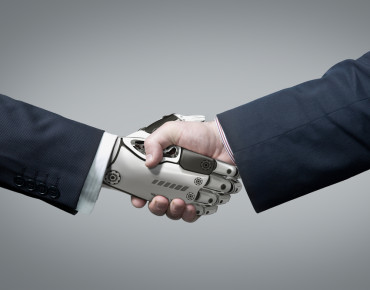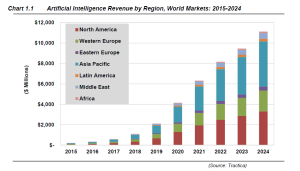Enterprises Learn Artificial Intelligence Lessons

In Hollywood, artificial intelligence-equipped beings run amok to take control of the world and the human population. In enterprises, the integration of AI into a growing number of software tools, powerful processors, and huge amounts of data will generate $11.1 billion in sales of AI systems for enterprise applications by 2024, compared with $202.5 million this year.
That's the prediction Bruce Daley, principal analyst at Tractica, makes in a recent report, "Artificial Intelligence for Enterprise Applications." AI is spread across cognitive computing, machine learning, deep learning, predictive application programming interfaces (APIs), natural language processing, image recognition, and speech recognition, as well as newly developed models emerging from academia such as neuromorphic computing.
Typically, AI splits into two forms: Weak and strong. Strong AI, exemplified by IBM Watson, transitioned from the champion's chair on "Jeopardy" to helping veterinarians treat animals and allowing researchers to understand human emotions based on their writings. Weak AI, on the other hand, focuses on one part of a problem, then comes up with algorithms that modify themselves, typically creating results that are significantly better than human efforts, Daley said. This form of AI is best-suited for particular business tasks such as credit scoring, he said.
Despite the disparity in types and use cases, some common bonds tie these AI systems together: Data and storage, said Daley. These compute-intensive applications also require a lot of IT resources for maintenance, integration, and design, he said.
"I think [AI] is going to drive sales of compute, networking, and data storage. It makes data even more valuable than it was before. It becomes a multiplier effect. Most data isn't generated about people or devices. It's data about data. This takes that even a step further," Daley told Enterprise Technology. "This is going to really mandate a bigger role for IT. We predict there's going to be a bigger role for maintenance, systems, and support than traditional systems in the past. It's still software. There are going to be bugs in it. You're going to need to upgrade it. The underlying platform will go down. You're going to need people to bring this back up."
Unlike an enterprise resource planning or customer relationship management system that supports sales representatives, accountants, or other employees, some AI systems actually do employees' jobs, he said.
"It's not supporting a banker. It is the banker. It's making the decisions. It really drives everything else in the business," said Daley. As a result, these AI systems must be extremely reliable and high-performance, he said.
An enterprise could, for example, use an AI system for credit scoring when consumers apply for credit when purchasing a house or opening a credit card, said Daley. Already in use by some financial institutions today, organizations increasingly are expected to adopt this tool because it's more accurate and less costly: Computers are accurate about 60 percent of the time while people make the right decisions about 40 percent of the time, he said.
The Downside
Problems arise, however, when consumers ask why they were turned down.
"I think there's a lot of misunderstanding, even by people in the field, about what's possible and what's not possible. There may come a time when you apply for credit – and it's being used today – you go to the institution and ask, 'Why did I get turned down for credit?' and they'll say, 'We don't know.' It might be for a legitimate reason or it might be for not legitimate mistakes, said Daley. "The computer might see that nine out of 10 Alisons default. There are always false correlations in statistics. That's a mistake no human would make but a computer would make."
IT must increase its educational role, both before and after the enterprise invests in AI. It's important that business leaders recognize AI is not infallible; that human intervention will be necessary to ensure high-quality customer service, adherence to federal regulations (such as anti-discrimination in lending), and that companies invest in the "ability to do forensic computing" so they can back-track to figure out AI systems' reasoning, he said.
Further adoption of AI also should cause IT to reconsider some of its cloud usage, said Daley. Enterprises can use artificial intelligence to discern the value of the data they're storing and determine whether to use public, hybrid, or private cloud, or opt for on-premise, based on the value and importance of the information, and the cost, performance, reliability, and back-up processes of the enterprise's cloud service providers, he noted.
"An AI system, in a fraction of the time it takes a person, would look at a 10,000 gigabyte storage system and decide where to send it," said Daley. "I think there will be a lot of opportunity for people in this transition. It'll change how many people are required to do things and what they're doing."
Some industry leaders are leery about AI's impact on humanity, business, and the global economy.
"I am in the camp that is concerned about super intelligence. First the machines will do a lot of jobs for us and not be super-intelligent. That should be positive if we manage it well," wrote Bill Gates in a Reddit Ask Me Anything (AMA) in January 2015. "A few decades after that though the intelligence is strong enough to be a concern. I agree with Elon Musk and some others on this and don’t understand why some people are not concerned."
However, AI is not always accurate, people run the machines, and using technology to automate some mundane tasks allows individuals to pursue more interesting jobs, argued Daley. AI also will improve safety: Between 2009 and 2013, about 166,000 people died in vehicle accidents, according to the Insurance Institute for Highway Safety. Self-driving or highly automated vehicles will eliminate many man-made errors, said Daley, dramatically decreasing highway deaths. But art and cultural pursuits tied to emotions, not formulas, will remain in humans' domain, he said.
"Everything in AI has to be mathematically expressible so there has to be something you can express in the form of formulas and algorithms. Human intelligence is much, much more complex than that," said Daley. "You couldn't have artificial intelligence that made aesthetic judgements until you could mathematically express what aesthetics are. And so a lot of the fear of AI comes from people who overlook that it's a mathematical equation."
Related
Managing editor of Enterprise Technology. I've been covering tech and business for many years, for publications such as InformationWeek, Baseline Magazine, and Florida Today. A native Brit and longtime Yankees fan, I live with my husband, daughter, and two cats on the Space Coast in Florida.











